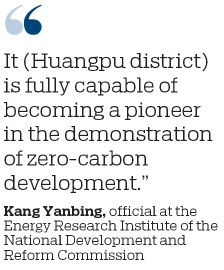Huangpu lures $15.2b in investment projects
A recent event in Guangzhou, Guangdong province, attracted major investment to the city's Huangpu district that strengthened its determination to further high-quality development, especially in the context of China's goal to peak carbon emissions by 2030 and achieve carbon neutrality by 2060.
The seventh Guangzhou Annual Investment Conference China got underway on Tuesday. Huangpu district signed a group of projects, covering sectors such as new-generation information technology, highend services, biopharmaceuticals and headquarters economy. The total investment approached 100 billion yuan ($15.23 billion).
Invited experts and entrepreneurs expressed admiration for the district's efforts to attract investment. Among them was Robin Li, chairman and CEO of internet search giant Baidu.
"Among the cooperation between Baidu and Guangzhou, the most impressive is the launch of the autonomous driving Mobility-as-a-Service platform, which is jointly created by Huangpu district and Baidu Apollo. It is a global first," Li said in a video address at the event.
Baidu's innovative technologies, products and operation models, including autonomous driving, intelligent transportation and digital city, are being implemented in Guangzhou, Li said. "This makes autonomous driving a reality in the lives of ordinary people."
Between 2016-20, Huangpu district secured more than 700 high-quality projects in sectors including biopharmaceuticals, displays, new energy vehicles and internet, according to the local government.
During China's 14th Five-Year Plan (2021-25), the district is poised to attract more quality and heavyweight projects to help to achieve an industrial output expected to exceed 1 trillion yuan.
Experts and company representatives shared their insights in Huangpu's development opportunities and transformation, especially under the global objectives in terms of carbon emissions peak and carbon neutrality, at a parallel forum held on Tuesday.
"As China has vowed it would reach its carbon emissions peak before 2030 and achieve carbon neutrality by 2060, the country needs to develop a batch of zero-carbon demonstration zones featuring new technologies, new business models and new mechanisms," said Kang Yanbing, director of the sustainable development research center at the Energy Research Institute of the National Development and Reform Commission.
Huangpu district has gathered a large number of green energy companies, Kang said. "It (the district) is fully capable of becoming a pioneer in the demonstration of zero-carbon development."
The district has 211 green energy companies each with a main business revenue surpassing 20 million yuan. It also has seven national-level green industry research and development institutes and 76 provincial-level ones.
South Korean automaker Hyundai sited its first overseas hydrogen fuel-cell system production and sales base in Huangpu district, which has been under construction since March.
Expected to be complete by the second half of 2022, the project has a planned annual production capacity of 6,500 hydrogen fuel-cell systems.
As a core area of Guangzhou's hydrogen energy development, Huangpu district has introduced a series of supportive policies targeting the sector. It also has a solid industrial foundation and large market for application, which has helped the cooperation, according to Hyundai.













